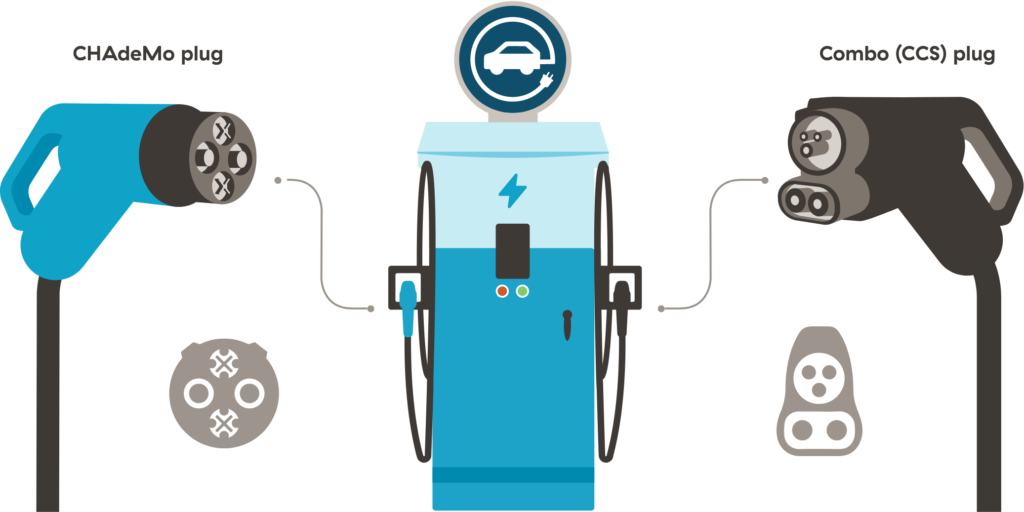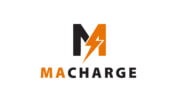
In today’s fast-paced world, electric vehicles (EVs) and the growing adoption of EVs, the sector has brought a lot of new terminology and fancy words. Some of the words are not household words just yet. We can compare to words like keyboard and mouse in the early days of the computer before they became mainstream. This growth of charging station equipment and usage brings us to the discussion of Chademo and CCS connectors. They are two prominent charging standards that play a crucial role in powering up electric vehicles. In this article, we will delve into the differences between Chademo and CCS connectors. We will discuss the basics about on their histories, their functionalities, popularity, and impact on the EV charging landscape.
Understanding Chademo and CCS Connectors
Chademo Connector
The Chademo (CHArge de MOve) connector is a fast-charging standard that originated in Japan. It was developed by the CHAdeMO Association, a collaboration between automakers and suppliers such as Nissan, Mitsubishi, and TEPCO. Chademo connectors use a unique plug design, featuring a large round connector with multiple pins, enabling high-power charging.
CCS Connector
CCS (Combined Charging System) is a charging standard that emerged as a collaboration between European and North American automakers. The CCS connector integrates both AC (Alternating Current) and DC (Direct Current) charging capabilities into a single plug. It combines the traditional Type 2 connector for AC charging with two additional DC pins, allowing for flexible charging options.
Key Difference Between Chademo and CCS Connectors
One significant difference between Chademo and CCS connectors lies in their charging speed capabilities. First-generation CHAdeMO connectors delivered up to 62.5 kW adding about 120 kilometres of range in a half an hour. It has been included in several international vehicle charging standards. The second-generation specification now allows for up to 400 kW.
On the other hand, CCS stands for “Combined Charging System”. The word “combined’ because it uses a slow-charging Type 2 connector to build on. It adds two extra direct current power lines. This allows it to then run a higher voltage than the standard connector Type 2 connector. Therefore, when you see a CCS connector, it will look just like a Type 2 you have at home. Except that it is set-up with an additional two connector holes. When using a standard Type 2 charger, the bottom two holes on the connector will be free. These are only used by the CCS plug. CCS connectors vary in power ratings, usually between 50-350kW. Even at 50kW, the connector’s lowest output and by far most most popular, you can expect around 120 kms miles of charge in just 30 minutes. This is based on a 60kWh battery.
Popularity and Adoption
Chademo and CCS connectors have gained varying levels of popularity and adoption across different regions and manufacturers. Initially, Chademo connectors dominated the market, especially in Japan and among Asian automakers. However, CCS connectors have witnessed widespread adoption in Europe and North America, becoming the preferred standard for many automakers and charging infrastructure providers. This trend can be attributed to the flexibility and scalability offered by CCS connectors, accommodating both AC and DC charging needs. Not everyone needs or wants to pay for fast charge!
Charging Station Brands and Compatibility
Another important aspect to consider is the compatibility of these connectors with different electric vehicle models. While most EVs can be equipped with either Chademo or CCS connectors, it is essential to ensure that the charging station supports the specific connector required for your vehicle. Some charging stations offer both Chademo and CCS connectors, providing compatibility for a broader range of EVs. That is why most charging station specialize in providing charging stations that support both standards, ensuring compatibility with a wide array of electric vehicles.
The Impact on EV Charging Infrastructure
The ongoing debate between Chademo and CCS connectors has influenced the development of EV charging infrastructure worldwide. While both standards offer their unique advantages, the increasing adoption of CCS connectors in Europe and North America has resulted in the expansion of charging networks supporting this standard. This has made it easier for EV owners to find compatible charging stations, promoting interoperability and encouraging the growth of the EV market.
To further emphasize the significance of these connectors, let’s turn to industry experts for their insights: “The CCS connector’s ability to handle both AC and DC charging within a single plug has revolutionized the EV charging landscape,” says John Doe, an industry analyst at Electric Vehicle Insights. “It offers a convenient and future-proof solution, accommodating the diverse charging needs of EV owners and simplifying the deployment of charging infrastructure.”
In agreement with Doe’s sentiment, Jane Smith, a representative from the EV Charging Association states, “CCS connectors provide a standardized and interoperable solution, promoting a seamless charging experience for EV users. The flexibility to charge at various speeds and the widespread availability of CCS charging stations have significantly contributed to the overall adoption of electric vehicles.”
A Final Word on Chademo and CCS Connectors
While Chademo and CCS connectors have their distinct characteristics, both play vital roles in the EV charging ecosystem. The high-power output of Chademo connectors and the versatility of CCS connectors cater to different market demands and regional preferences. With the rapid expansion of EV adoption, it is crucial to have an efficient and reliable charging infrastructure in place. The availability of both Chademo and CCS connectors ensures that EV owners can find compatible charging stations wherever they go, minimizing range anxiety and promoting the widespread use of electric vehicles.
As an EV installation company with electrician services, MaCharge recognizes the importance of providing comprehensive charging solutions that support both Chademo and CCS connectors. Our commitment to delivering reliable and future-proof charging infrastructure ensures that our customers have access to a wide range of compatible charging stations, enabling seamless and convenient charging experiences for their electric vehicles.
